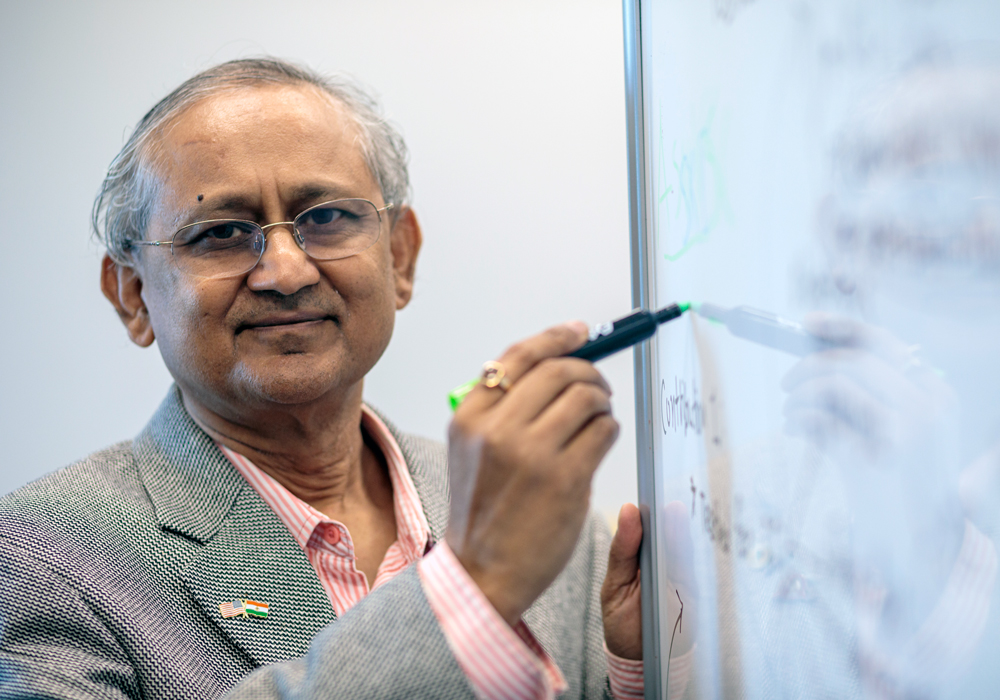In February, Amit Sheth, founding director of the Artificial Intelligence Institute of South Carolina, hosted Provost Donna Arnett, Vice President for Research Julius Fridriksson and College of Engineering and Computing Dean Hossein Haj-Haririto show off the institute’s ongoing success. President Michael Amiridis had already visited the institute in October.
Since its inception three and a half years ago, the institute has enjoyed rapid growth, earned significant accolades and fostered multiple partnerships in its efforts to infuse artificial intelligence expertise into the framework of research at South Carolina. Sheth and the five new faculty he helped recruit have secured funding for a growing team of over 40 researchers, including nearly 30 Ph.D. students funded through research grants.
This last component of the AI institute’s endeavor is critical, according to Sheth, who emphasizes the institute’s appeal as a place for talented graduate students, post-docs and new faculty to focus exclusively on cutting-edge research for a fast-growing sector.
“For students, this is very unusual. If you go to other departments, a significant percentage of students will be funded as teaching assistants,” says Sheth. “We've got enough money to fund all our students. We could fund more, except that we have run out of space.”
Fast ascent
Members of the university’s leadership aren’t the only ones who are impressed with Sheth’s fast ascent at USC. The February visit from USC’s top brass came on the heels of a major announcement from the IEEE Computer Society, which awarded Sheth the 2023 W. Wallace McDowell Award for his contribution to knowledge-enhanced computing, information integration and data and service semantics. The award is given to one person worldwide annually for outstanding theoretical, design, educational, practical or related innovative contributions.
Sheth, who came to USC in 2019 following 12 years as the LexisNexis Ohio Eminent Scholar at Wright State University, is no stranger to kudos. The computer science and engineering professor has also been recognized as a fellow in the Association for the Advancement of Artificial Intelligence, the American Association for the Advancement of Science, the Association for Computing Machinery and the IEEE — some of the biggest professional associations in his field.
His wide-ranging work with metadata semantics and ontologies — his efforts, in other words, to enhance and improve the utility of AI data output for the end user — has positioned Sheth as a leading authority within the field, and he is now listed as one of the top 50 computer science researchers in the U.S. by Research.com.
“We've got enough money to fund all our students. We could fund more, except that we have run out of space.”
For a specific example of his research pursuits, see his team’s use of knowledge-infused learning to make AI-generated output more useful for health care. Current AI prediction or recommendation is often seen by doctors and nurses as untrustworthy and unusable because the AI algorithm’s functioning isn’t explained and does not follow required clinician practice guidelines. By modifying deep learning with relevant domain and process knowledge, his team has developed explainable, safe and ultimately more trustworthy AI. Sheth hopes to make AI more acceptable in critical applications like health care.
“By tying it with the knowledge that humans understand and create and manage, I'm making this understandable,” says Sheth. “We take all the gobbledygook that statistical learning and deep learning do, and we are making it explainable.”
With a decade in industry R&D and as a tech entrepreneur, in addition to his work in academia, Sheth understands industry needs. He has founded or co-founded four companies that draw on his research in artificial intelligence, including the first semantic search company in 1999, which pioneered knowledge graph technologies similar to what Google also started using in 2013, and Cognovi Labs, an emotion-AI company that incorporates psychology into the choices humans make.
It’s little surprise that units across the university want to partner with Sheth. In fact, that’s all part of the larger plan — to bring emerging AI technologies to bear on as many disciplines as possible. To date, the institute has developed partnerships with the Colleges of Nursing, Education, Arts and Sciences, Engineering and Computing, Information and Communications, the Schools of Public Health and Medicine, and other units, quickly making it a hub for interdisciplinary and translational research.
Other collaborations
In addition to health care, the institute is collaborating with faculty to explore applications for autonomous vehicles, smart manufacturing, disaster management and education.
“We were set up from the beginning to be university-wide and to strongly collaborate with the rest of the university, and we've done exceptionally well,” he says. “We have active research collaborations with eight of the colleges and schools, maybe more — we have over 25 collaborative team projects — and that has led to some center-level proposals.”
While those center-level grants are still on the horizon, the institute continues to secure plenty of external funding — Sheth remains focused on building out the research enterprise and adding to his record of $33 million of external research funding so far.
And the most rewarding partnerships may be the ones he is building with the next generation of AI researchers, starting with those fully funded graduate students and post-docs.
“It’s an academic family,” says Sheth. “The relationship is professional, but it's fully nurturing. That is the environment. My graduate students get an unfair advantage compared to their counterparts because I've been in the profession more than 35 years now — 29 years as a professor.”
